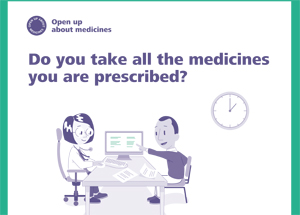Reading experts design NHS campaign to reduce medicine wastage
Release Date 17 March 2015

The University of Reading has teamed up with NHS Southampton City Clinical Commissioning Group (CCG) for their new campaign aimed at reducing the amount of medicines wasted in the city.
Launched this week, Open Up About Medicines is designed for patients by patients. The campaign incorporates posters, leaflets, videos and a website developed by the University's Centre for Information Design Research. The aim is to encourage Southampton residents to ‘open up' about their actual need for and use of prescription medicines when they talk to health professionals.
Unused medicines cost the NHS millions of pounds - the annual cost was estimated at £300 million in 2010, of which £150 million was estimated as avoidable. In Southampton this equates to approximately £1 million per year.
Professor Alison Black led the design project. She said: "Medicine wastage is a massive financial drain on our health services so the University was pleased to develop the ‘Open Up' campaign. Crucial to the campaign concept was reflecting the issues of medicine waste, the needs of the CCG and of those on the ground, including patients, groups, GPs and community and hospital pharmacists. It was important to encourage long term patients who have repeat medication which they often don't take, to feel empowered to tell health professionals without feeling anxious.
"The enthusiasm from the community resulted in some vital feedback. In particular we found people wanted clear messages about what they could do and how they could help themselves. The design also addressed some significant knowledge gaps. Many people believed that if they returned unused medicines to the pharmacy they will be reused - but this isn't true - they can only be reused if they haven't left the pharmacy. Additionally people had had mixed experiences of trying to talk with their GP and of taking medicines with them into hospital.
"To maximise the messages, copy and design was built on the growing research literature on behaviour change. We are proud of the results and wish CCG the very best of luck with their campaign."
Clinical Chair of the CCG and local GP, Dr Steve Townsend, added: "Some patients feel they no longer need all the medicines their doctors prescribe for them but continue ordering and collecting them because they worry about beginning a conversation with a healthcare professional about how they feel.
"Others are confused by the number of medicines that are prescribed, how to order and collect them and what to do with their medication if they need to go into hospital. This can lead to some medicines never being used and then wasted."
The University of Reading's Centre for Information Design Research is part of the award winning Department of Typography & Graphic Communication. It focuses on how to design complex information so it can be conveyed clearly. Last year the Centre worked with Berkshire Healthcare to produce a new clear and accessible guide to support people who care for those with dementia.
